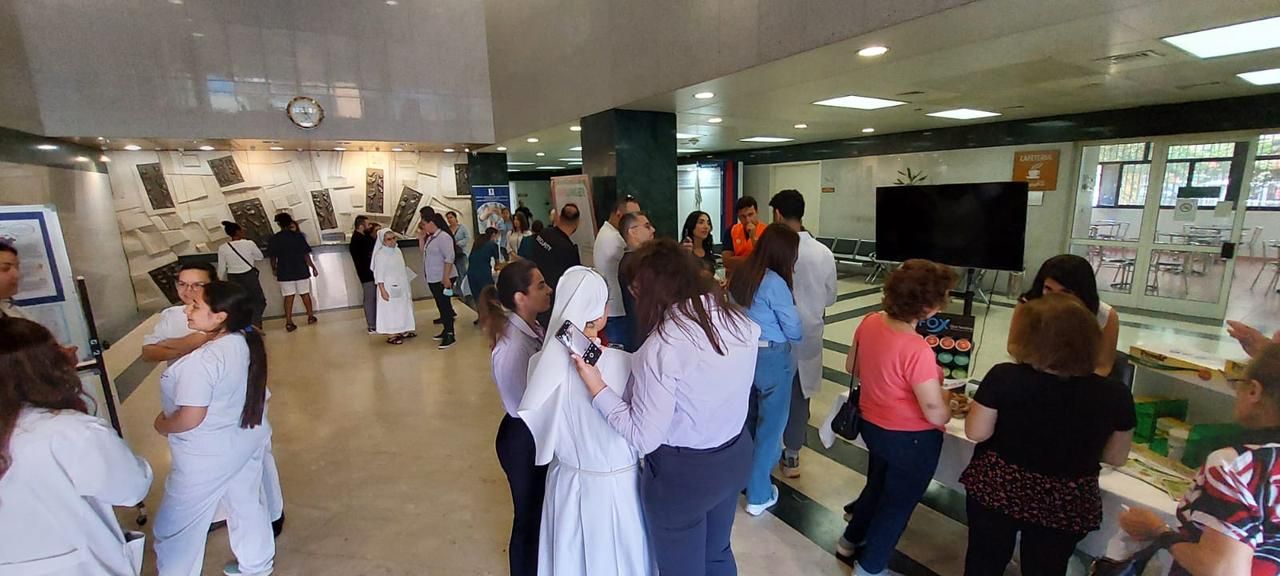
Activities, exchanges, personalities and emotions: World No Tobacco Day was celebrated with brilliance at the Saint Joseph University Hospital. A salutary initiative, resolutely oriented toward a smoke-free Lebanon.
In the bright hall of the Saint Joseph University Hospital, it wasn’t the sound of carts or the hurried footsteps of medical staff that one could hear this Friday, but bursts of voices, laughter and at times, softly whispered confidences. To mark World No Tobacco Day, the establishment had traded the silence of care for the lively buzz of a collective mobilization for smoking cessation.
An Informative and Interactive Journey
Throughout the day, a series of information stands welcomed a varied public: repentant smokers, skeptical onlookers, young students or simple companions drawn in by the atmosphere.
The NGO LiveLunger took charge of reminding, supported by evidence, the ravages of tobacco. Synergia, partner of the event, presented the most effective quitting methods.
"The objective was to offer concrete answers, without judgment, in a humane and motivating atmosphere," explained Leila Abou Habib, organizer of the event and specialist in smoking cessation.
Health professionals led with pedagogy areas devoted to nutrition, weight management, and also psychological support — a lever often underestimated in a successful approach.
Three Pillars for Better Quitting
Spread across several clearly marked zones, the specialists animated with clarity and kindness three essential hubs:
• Dietetics and weight management, to accompany former smokers in their transition without unnecessary weight gain;
• Psychological support, often relegated to the background but essential for sustainable cessation;
• And prevention of tobacco’s harms, using accessible language and impactful visual aids.
Revealing Testimonies
“I thought this kind of day would be guilt-inducing, but it was quite the opposite. I got concrete answers to my questions,” said Randa, 38, an occasional smoker, who came “just to look,” but left with an appointment for a first support session.
“I’ve been smoking for 30 years… but for the first time, I’m leaving with a real plan,” confided Tony, in his fifties, clutching in his hand a flyer on behavioral therapies. At his side, Tania, 25, just out of a workshop on the effects of tobacco on fertility, let out with a half-smile: “I thought I was ‘just’ a social smoker… I’ve just realized I’m addicted. But I also understood that I can change.”
A Festive and Memorable Event
The success of this day also lay in its warm and joyful ambiance. Fun activities, quizzes, health tests, gift distribution... In a relaxed and benevolent atmosphere, the public health messages were conveyed gently, without guilt. A clearly winning formula.
A Mobilization of Public Figures
The event’s visibility was also enhanced by the presence of several committed figures, including Abir Alame, president of the Order of Nurses, August Bakhos, Mayor, Elsa Yazbek, President of the NGO TFI, Clémence Achkar, Miss Lebanon, and actor Youssef Haddad, highly in demand for selfies.
But it was Elsa Yazbek who reminded, with gravity, the urgency of the fight: “Tobacco is the leading preventable cause of death in the world. It is time for Lebanese society to free itself from this addiction.”
Words, Actions… and Seeds Sown
Throughout the day, visitors were able to participate in thematic activities, win prizes and benefit from free health check-ups — all in a friendly and open atmosphere, far from the moralizing tone often associated with anti-smoking efforts.
A strong message, in a country where cigarettes are still perceived as a trivial habit, even socially valued.
In conclusion, the Saint Joseph University Hospital reaffirmed its firm commitment to a healthier society, saluting the diversity of participants, the quality of exchanges and the involvement of partners.
A Promise of Fresh Air
Because yes, this Friday, tobacco lost ground. This Friday, dozens of Lebanese left with a seed sown: the decision to quit. And that’s no small feat. In a tired, disillusioned, sometimes resigned Lebanon, this day showed that health can once again become a conscious, collective, and joyful choice.
This day was not just an event: it was a strong signal, a promise, a breath of fresh air in a country that sorely lacks it.

Comments